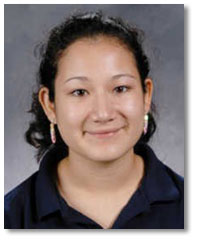Finalist, 2006 Kids Philosophy Slam
Mindy Lu, age 17
Hershey, Pennsylvania
 Fear is a more powerful environment,
emotion, and motivation than hope. Many significant world events
have been borne of fear. Great empires have been built upon controlling
its people through fear and warfare. Dictators use fear as a primary
weapon, imprisoning and killing political prisoners, enforcing
strict codes of conduct. Dictators use environments of fear to
control people, to keep people from revolting. Terrorists create
atmospheres of fear to accomplish political agendas and undermine
political leaders, eventually causing the break down in their
society.
Fear is a more powerful environment,
emotion, and motivation than hope. Many significant world events
have been borne of fear. Great empires have been built upon controlling
its people through fear and warfare. Dictators use fear as a primary
weapon, imprisoning and killing political prisoners, enforcing
strict codes of conduct. Dictators use environments of fear to
control people, to keep people from revolting. Terrorists create
atmospheres of fear to accomplish political agendas and undermine
political leaders, eventually causing the break down in their
society.
Fear, as an emotion can trigger biological responses in humans
and other animals that save lives. Hope is fleeting; Emily Dickinson
called it “the thing with feathers that perches the soul.”
Humans are said to be born with but two fears: that of falling
and of loud noises. Hope cannot save lives; it may actually kill—the
hope a chronically ill person may have may only put off treatment
that could cure the person. Unlike hope, fear inspires action.
Fear’s most important power is that it can improve society
because fear is universal. Fear of a nuclear holocaust between
the U.S. and Russia is what kept the world from becoming a massive
mushroom cloud. Fear of disease and epidemics leads to action—typhoid
fever was eradicated in the U.S, through the improvement of sanitation
in the sprawling urban slums. Fear is innate, the instinct of
survival, not of procrastination.
Fear motivates people every day. Whether abnormal fear hinders
people from fulfilling their potential, or healthy fear protects
people and motivates them to make prudent decisions, fear can
be the motivation of ones lifetime (namely the fear of Hell).
After one has a near-death-experience, one reevaluates their lives
and changes it, calls their loved ones and tells them they are
loved, pursues their neglected passions and talents. A close friend
of mine’s entire outlook on life and his future changed
after he was involved in a major accident that almost killed him.
He realized—as people do in general after such events that
maybe they were taking for granted someone or some aspect of their
lives that they should truly cherish. Hope on the other hand,
does the opposite; it breeds complacency, causing people to revel
in wistfulness for the someday when things will be better. The
novel Fight Club, by Chuck Palahniuk illustrates this point. Raymond
Hessel, gas station cashier, is held by gunpoint and told, “…Go
back to school. If you wake up tomorrow morning, you find a way
to get back into school… I know who you are. I know where
you live… In three months and then in six months, if you
aren’t back in school on your way to being a veterinarian,
you will be dead.” After the protagonist releases him, he
tells him, “Raymond K. Hessel, your dinner is going to taste
better than any meal you’ve ever eaten, and tomorrow will
be the most beautiful day of your entire life”. Fear pushes
people to overcome circumstances and truly live. Isn’t life
more valuable to people after it is threatened, after they realize
what it is worth? Fear can make people feel alive, improves lives,
controls and liberates, and that is much more powerful than the
loftiness of hope.

